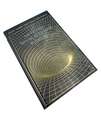The Art of War: Great Works that Shape our World
Autor Sun Tzu Introducere de Dr Andrew Wilsonen Limba Engleză Hardback – 30 mar 2020
FLAME TREE's Great Works That Shape Our World is a new series of definitive books drawing on ancient, medieval and modern writing. Offering a fund of essential knowledge, and spell-binding stories it satisfies every facet of human interest: scientific, philosophical, sociological, romantic, dramatic and mysterious. From the ancient wisdom of the Mahābhārata to the curious power of Don Quixote, Boccaccio's Decameron and Melville's classic Moby Dick, from the scientific wonders of Isaac Newton and Albert Einstein to the great thinkers of Western and Asian philosophy.
Created to entertain, inform and enrich, the new series brings infinite variety to refresh the mind, presented in beautiful editions for the modern market. Each book features a new, accessible introduction, specially written for these editions, placing the book in context both as part of the new series, and highlighting its special contribution to the advancement of human understanding; they examine the significance of each work, their impact at time of publication, and their influence today.
Preț: 118.50 lei
Preț vechi: 128.27 lei
-8% Nou
Puncte Express: 178
Preț estimativ în valută:
22.68€ • 24.65$ • 19.07£
22.68€ • 24.65$ • 19.07£
Carte indisponibilă temporar
Doresc să fiu notificat când acest titlu va fi disponibil:
Se trimite...
Preluare comenzi: 021 569.72.76
Specificații
ISBN-13: 9781839641510
ISBN-10: 1839641517
Pagini: 256
Dimensiuni: 156 x 238 x 28 mm
Greutate: 0.54 kg
Ediția:Nouă
Editura: Flame Tree Publishing
Colecția Flame Tree Collections
Seria Great Works that Shape our World
Locul publicării:London, United Kingdom
ISBN-10: 1839641517
Pagini: 256
Dimensiuni: 156 x 238 x 28 mm
Greutate: 0.54 kg
Ediția:Nouă
Editura: Flame Tree Publishing
Colecția Flame Tree Collections
Seria Great Works that Shape our World
Locul publicării:London, United Kingdom
Notă biografică
Andrew R. Wilson (introduction) is a professor of Strategy & Policy at the U.S. Naval War College, where he teaches a mix of strategic theory and military history to help hone the critical analysis skills of military officers. In particular, he looks at how the classics of Chinese military thought, including Sun Tzu, have influenced Chinese strategic behaviour from the early Imperial period to the present. He received a PhD in History and East Asian Languages from Harvard University and taught Chinese history at Harvard and at Wellesley College prior to joining the Naval War College faculty in 1998, where he currently holds the John A. van Beuren Chair of Asia-Pacific Studies.
The ancient Chinese military general, strategist and philosopher Sun Tzu was estimated to have been living between c. 544 and 496 BC. Also known under the names Sun Wu and Sunzi, Sun Tzu was widely recognised to be the author of The Art of War, an ancient and world-renowned Chinese military strategy book. A great influence on Chinese history and culture, Sun Tzu’s beliefs are known through his writing and told through legend.
The ancient Chinese military general, strategist and philosopher Sun Tzu was estimated to have been living between c. 544 and 496 BC. Also known under the names Sun Wu and Sunzi, Sun Tzu was widely recognised to be the author of The Art of War, an ancient and world-renowned Chinese military strategy book. A great influence on Chinese history and culture, Sun Tzu’s beliefs are known through his writing and told through legend.
Descriere
Focusing on military strategy, psychology and tactics, The Art of War has been a source of great strategic inspiration throughout the ages and its enduring wisdom has had a far-reaching impact beyond its Ancient Chinese origins. This new edition offers a comprehensive new introduction, with commentary and notes on the core text.
Recenzii
"There is no instance of a country having benefited from prolonged warfare."
"What the ancients called a clever fighter is one who not only wins, but excels at winning with ease."
"If you know the enemy and know yourself, you need not fear the result of a hundred battles. If you know yourself but not the enemy, for every victory gained you will also suffer a defeat."
"If words of command are not clear and distinct, if orders are not thoroughly understood, then the general is to blame."
"What the ancients called a clever fighter is one who not only wins, but excels at winning with ease."
"If you know the enemy and know yourself, you need not fear the result of a hundred battles. If you know yourself but not the enemy, for every victory gained you will also suffer a defeat."
"If words of command are not clear and distinct, if orders are not thoroughly understood, then the general is to blame."
Cuprins
Foreword by Marc Benioff ix
Preface by Thomas Cleary xv
Introduction xxiii
A Note on the Translation xxxvii
1. Calculations 3
2. Doing Battle 17
3. Planning Attacks 29
4. Formation 47
5. Force 57
6. Weakness and Strength 67
7. Armed Struggle 83
8. Nine Changes 99
9. Army Maneuvers 111
10. Ground Formation 131
11. Nine Grounds 149
12. Fire Attacks 179
13. Using Spies 189
Acknowledgments 201
Notes 205
Suggestions for Further Reading 209





























